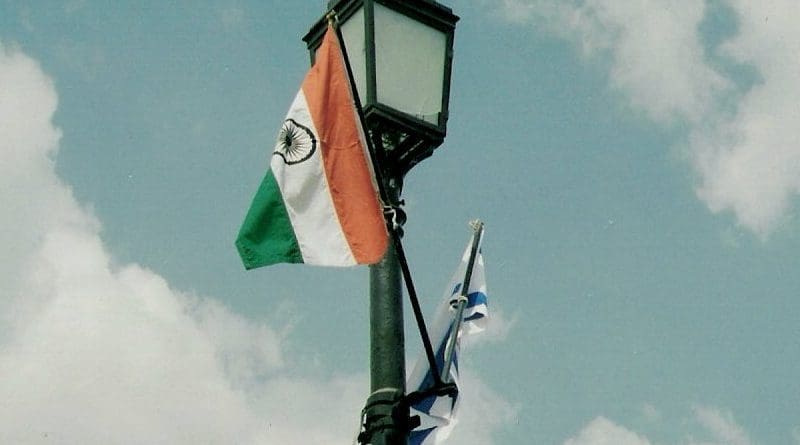In Deadlocked Israel-Palestine Peace Process, Little Room For Indian Role – OpEd
By Md. Muddassir Quamar*
Historically, India has maintained a steadfast position on Palestine. It supports a negotiated political solution to the Israeli-Palestinian conflict leading to formation of a sovereign and united state of Palestine with East Jerusalem as its capital, existing alongside Israel. During his visit to Palestine in October 2015, President Pranab Mukherjee said, “India would like to see the people of Palestine living within secure and recognized borders, side by side and at peace with Israel, as endorsed in the Arab Peace Initiative, the Quartet road map and relevant United Nations Security Council Resolutions.” Over the years, however, the Indian position has evolved with the changing circumstances. The most noticeable change was the establishment of diplomatic relations with Israel in 1992 and since then India’s relations with Israel has steadfastly improved. In spite of its growing relations with Israel, India has maintained its support for the Palestinian cause.
Analysts see India-Israel relations gaining momentum since the change of government in India in 2014. In fact, at the time of the previous Bharatiya Janata Party-led National Democratic Alliance government (1999-2004) also high-level engagements with Israel had increased including the visit of Prime Minister Ariel Sharon to New Delhi in 2003. Prime Minister Modi is expected to visit Israel in early next year that will certainly strengthen the friendly relations. In July 2015, India along with four other countries (Kenya, Ethiopia, Paraguay and Macedonia) abstained from the vote in UNHRC resolution adopting the report of the Independent Commission of Inquiry on the 2014 Gaza Conflict.
This was seen as a clear case of a change in Indian position on the Israeli-Palestinian conflict. Though officially India maintained that there is “no change in Indian position on support to the Palestinian cause” and claimed that it abstained because of the reference in the report to International Criminal Court (ICC), established by the 1998 Rome Statute, to which India is not signatory. Nevertheless, media reports suggested high-level diplomatic contacts between India and Israel were, if not completely, partially responsible for Indian decision to abstain.
Currently, the Israeli-Palestinian peace process is under suspension (since April 2014) and given that the Obama administration is in its last months, there is no possibility of it resuming anytime soon. However, there are indications of Arab countries especially Saudi Arabia and Egypt making some backroom efforts to resume talks. In July Egyptian Foreign Minister Sameh Shoukry visited Israel to find ways to resume the peace process. Later that month, a Saudi delegation led by retired Major General Anwar Eshki visited Israel and held discussions with Ambassador Dore Gold, the Director-General of Israeli foreign ministry and met with a number of Members of the Knesset. On 23 August, Egyptian President, Abdel Fattah el-Sisi, issued a statement that Russia is willing to host Israeli Prime Minister Benjamin Netanyahu and Palestinian President Mahmud Abbas in an effort to resume the suspended talks. On part of Saudi Arabia and Egypt, these efforts are largely directed at regaining the lost ground especially vis-à-vis Iran as far as the Palestinian question is concerned.
It is important to understand that though the resolution of Israeli-Palestinian conflict is important for peace and stability in the region, there cannot be any substantial movement towards resolution until both sides see incentives in having peace, which is not the case situation. The Palestinian side is a divided house more than ever before and do not have a pragmatic and visionary leadership to be able to be able to lead the process and achieve peace. On the Israeli side as well, a majority continues to see Palestinians as terrorists who should not be entered into talks. Hence, the international community cannot do much until the facts on the ground substantially change leading to incentives for both sides for entering into negotiations.
For India, in the given circumstances, there is not much scope for a substantial role in reviving the peace talks or bringing Israel and Palestine on negotiations table. However, the changing geopolitical climate in the Middle East, lurking dangers of the conflict raging again and jihadi-terrorist elements finding a foot in Palestine, India cannot remain indifferent. Though India has friendly relations with both sides, it does not enjoy a substantial influence with either. One of the options India has is to take lead through multinational forums such as BRICS and emphasize on both sides the importance of resuming negotiations. Simultaneously, through its good relations with countries such as Egypt and Saudi Arabia, India can encourage resumption of negotiations. Bilaterally, it can also raise the issue individually with both Israeli and Palestinian leadership. The idea of direct involvement in the peace process is out of question because India neither has enough influence nor any direct interest in the conflict.
India will continue to support the Palestinian cause while maintaining close relations with Israel. India has been one of the major sponsors of development and nation-building efforts in Palestine and contributes USD 1 million annually to the United Nations Relief and Works Agency for Palestinian Refugees in the Near East (UNRWA). In 2014, it also pledged USD 4 million for reconstruction of the Gaza Strip and has been supporting a number of infrastructure, health and educational projects in Palestine.
On the other hand, Israel has emerged as its leading defence partners and there are several areas where the two have limitless but unexplored potentials especially in the fields of science and technology, agriculture, irrigation, water conservation etc. Hence, in the given circumstances, there is not much scope for a substantial recalibration of Indian position on the Israeli-Palestinian conflict.
*Md. Muddassir Quamar is researcher with the Middle East Institute, New Delhi. Comments and suggestions on this article can be sent on: [email protected]

